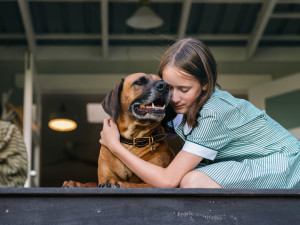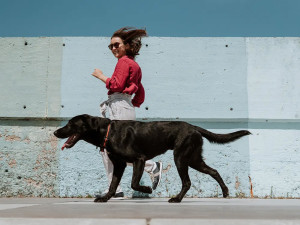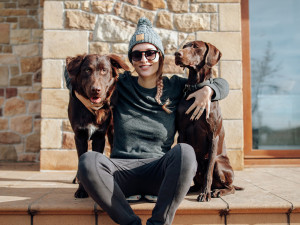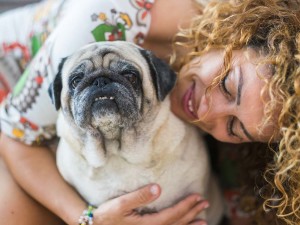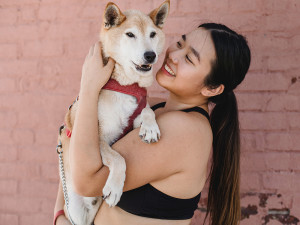Playing With Your Dog Can Help Their Brain Stay Healthy Longer, New Study Finds
A good old game of tug of war could help prevent doggie dementia.
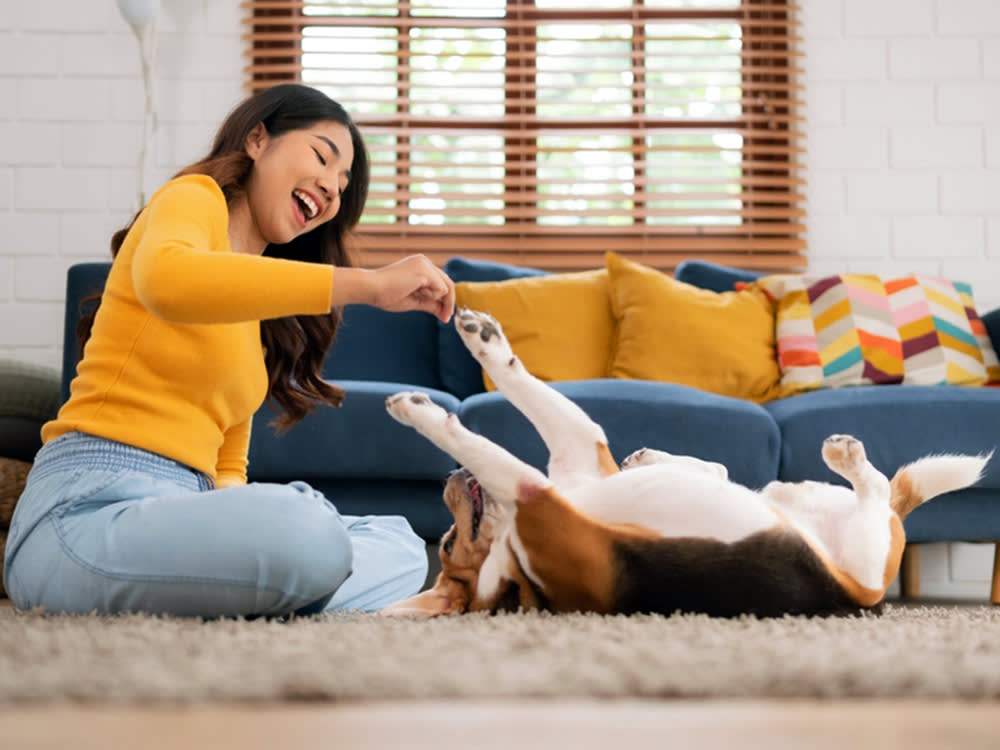
share article

Your pet wants you to read our newsletter. (Then give them a treat.)
Like humans, a dog’s brain changes as they age, causing memory problems (sadly, dogs can get dementia, tooopens in a new tab) and other cognitive difficulties. The great news is our pups are living longer than ever thanks to advancements in veterinary science and pet care. The not-so-good news is that those added senior years come with some difficulties. Cognitive decline can be scary and painful for dogs; it can lead to symptoms like confusion, pacing, getting stuck behind furniture, and increased aggression.
Fortunately, there are ways to set your pup up for their happiest possible golden years — and it’s easier (and way more fun) than you might guess. A new study finds that pups who get lots of playtime have healthier brains in their old age.
The study
To track cognitive health, researchers observed a small group of forty-five healthy Beagles. The Beagles were six years old when the study began, and they were tracked for three years. The pups were placed into three groups: one group were given a placebo, and the other two groups were given two drugs that researchers hoped had the potential to treat Alzheimer’s. All of the dogs were given daily exercise, socialization, toys, and group play.
Throughout the study, their brain shape and size were measured using magnetic resonance imaging (MRI); they were also given cognitive tests on things like memory, size discrimination, and black/white discrimination.
The results
Researchers found that there was no difference between the placebo group and the groups receiving drugs — the medication didn’t make a difference in the dogs’ brain development. But something else did make a difference: All of the dogs’ brains benefited from socialization and play. “The hippocampus increased … in all dogs,” wrote Jessica A. Noche, the lead author of the study. The hippocampus is a part of the brainopens in a new tab related to memory and learning; in humans and dogs, the hippocampus loses tissueopens in a new tab during the early stages of Alzheimer’s.
“Total hippocampal volume increased at an average rate of about 1.74 percent per year across treatment groups,” Noche wrote. In previous research, Beagles showed an age-related hippocampal decline over time. “We argue that these increases may be attributed to the high levels of behavioral enrichment in the present study that included social interaction, exploration, physical exercise, and sensory stimulation, all of which are known to induce a number of neurobiological changes.”
Bring out the toys
Noche added that this finding is significant because it shows “middle age may be a promising therapeutic window of behavioral intervention.” That means it’s never too late to help your pet’s brain get healthier — and even adopting a middle-aged or senior pet into a happy and active home might help them ward off cognitive decline.
Plus, playing with your dog is good for both of you. Previous research has found that older people with dogsopens in a new tab have lower rates of dementia themselves, likely because dogs encourage exercise and socialization in people. Spending time with dogs also increases oxytocinopens in a new tab, which can lead to reduced stress, increased pain tolerance, and a better sense of wellbeing.
The science is clear: Playtime is good for everyone. It’s fun, it’s bonding, and it can literally reshape your brain. So, go start a game of fetch with your pup — doctor’s orders.

Sio Hornbuckle
Sio Hornbuckle is a writer living in New York City with their cat, Toni Collette.
Related articles
![Older dog in Loyal drug trial to extend the lives of dogs.]() opens in a new tab
opens in a new tabA New Drug Could Make Your Dog Live Longer
LOY-002 is a drug aimed at improving your pet’s quality of life—and helping them live longer.
![Young caucasian cheerful blonde girl sitting and hugging her lovely cocker spaniel dog in cafe.]() opens in a new tab
opens in a new tab10 Longevity Tips From People Whose Pets Have Lived Incredibly Long Lives
Follow these vet-backed tips to help your best bud live a healthy and full life.
![Young Woman With Two Brown Dogs.]()
Research Finds Dogs With More Human and Animal Buddies Live Longer
A new study suggests that spending time with your pup isn’t just a way to avoid making plans; it’s great for their health.
![Happy golden retriever dog on a walk with owner in woodsy yellow and orange fall setting with leaves on the dirt trail.]() opens in a new tab
opens in a new tabHome Remedies for Dog Joint Pain Relief
DIY ways to help your pup cope with the pain.
![Curly haired blonde woman hugging her old pug dog]() opens in a new tab
opens in a new tabHow to Care For Your Older Dog
Learn how to make their senior years as comfortable as possible.
![Woman with long straight black hair and a gold nose ring holding a senior Shiba Inu mixed breed dog wearing a red harness]() opens in a new tab
opens in a new tabSenior Wellness Checks for Dogs
Tips to help your oldster live long and prosper.
